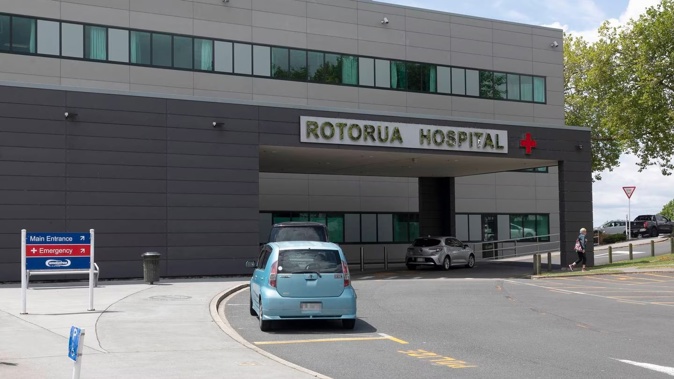
A Rotorua teenager has been waiting nearly seven years for the removal of a tumour, making it “excruciatingly” painful for him to do his job.
The 18-year-old, who did not want to be named for medical privacy reasons, is on the waitlist for surgery at Rotorua Hospital. However, his mother first alerted the doctor to a “big bump” on his body when he was 12.
His mother said they have been advised the surgery is “not an emergency” and there is a long waitlist.
“[He] wants it out as soon as possible to do his job properly without pain and everyday normal activities like showering.”
Their story comes as data from Te Whatu Ora - Health New Zealand shows there are 2463 people who are on the waitlist for surgery at Rotorua and Taupō Hospitals.
The data - received under the Official Information Act - also showed 929 surgeries were cancelled in the Lakes district last year. The data excluded the reasoning for patient cancellations. Of those, 773 had a rescheduled surgery date and 156 did not.
On February 10, the Rotorua Daily Post reported there were 762 people who had been waiting longer than four months for elective surgery in the Te Whatu Ora Lakes region as of November 2022.
Speaking to the Rotorua Daily Post, the teenager’s mother said he was 12 when the big bump on his body turned out to be a tumour.
The teenager was “referred immediately” to have it removed.
“They wanted to remove it straight away, but he had to wait until he turned 16 as his tumour was on his growth plate. This meant that [he] would need to fully grow or the surgery could stunt the growth.”
- Sydney mum forced to give birth in hospital carpark: 'This can't be happening'
- Two people injured after separate incidents in Rotorua
- 'Broken glass and screaming': Turbulence on flight puts seven passengers in hospital
Once he turned 16, specialists wanted it removed “immediately again”.
However, there were now “extreme risks” as the tumour was not only on his growth plate, but the nerves had now wrapped themselves around the tumour, and the main risk was he could lose the use of his limb. The wait for surgery had resulted in limited movement in this area of his body.
While waiting for surgery, the teenager’s mother said he felt like he did not fit in anywhere and decided he did not want to go to school anymore.
“He just wanted to stay home, and he became a hermit for a long few years.”
His mother, who is a high school teacher, supported his decision and started homeschooling him in 2019. This year, the teenager is in his final year of school.
He is now doing a building apprenticeship which he “absolutely loves”.
However, due to the tumour, he cannot do his job properly.
His mother said he experienced “intense pain” in the area of the body where the tumour was, making it “excruciatingly” painful for him to work.
“Therefore, he has to decline to do some jobs or compensate in other ways.”
His mother said this was causing them both grief, as there were still many units to complete in order to pass his apprenticeship.
“Unfortunately, if [he] can’t do his job to the expectations of a building apprentice, his employer will have to let him go. That also means the year and a half he has completed for his building apprenticeship will be for nothing.”
“We have sent letter after letter to help rush concern and expedite the process for removal of the tumour that is getting in the way of his work, now.”
The teenager said he tried to not let the wait for surgery bother him. However, the tumour was causing him pain whenever he did physical work such as that required for his apprenticeship.
He said if his employer let him go, he would have to find a different job. He still had “at least another two or three years” to complete his apprenticeship.
Te Whatu Ora Lakes hospital and specialty services interim lead Alan Wilson said current waitlists were “heavily influenced” by what had happened previously, including Covid lockdowns, which meant fewer elective surgeries could take place.
“When combined with issues such as increased staff sickness, this has hampered hospitals’ ability to deliver the number of planned care treatments expected.
“These undelivered numbers then tip over into the next month, creating bulges in waitlists that are occurring at a higher rate than treatment can keep pace with.
“This trend is expected to continue in the coming months.”
Wilson said any decisions to defer planned care were made in conjunction with clinical teams on the basis of careful consideration of patient safety, the needs of the patient, their whānau and available resources.
“These decisions are not taken lightly, and our focus is on how we continue to provide safe care to those acute patients who need it most.”
He said Te Whatu Ora continued to monitor waiting lists and maintained contact with patients to ensure, if necessary, their condition was reprioritised if there was a change in urgency.
Patients requiring acute and semi-urgent treatment were prioritised.
“We appreciate the impact that delays in surgery and treatment have on patients and their whānau, and we are working hard to reduce the waiting times for all patients.”
Te Whatu Ora Lakes encouraged anyone who was unhappy with their treatment to contact them.
Take your Radio, Podcasts and Music with you









